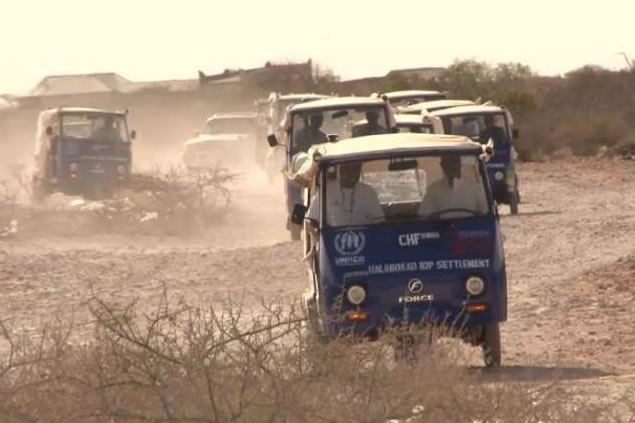
Thursday, September 27, 2012
By Faith Kasina

A fleet of tuk-tuks do business in Galkayo, bringing the promise of better times for the small teams of displaced people who maintain and drive them. © UNHCR Photo
GALKAYO, Somalia, September 26 (UNHCR) – Mohamed Issa Hussein, a budding entrepreneur in Galkayo's Halabokhad settlement for forcibly displaced people, has seen better days. Forced to flee his home along the Somali-Ethiopian border with his wife and seven children three years ago, it has been a tough journey rebuilding his life far from home.
After arriving in Halabokhad in northern Somalia's autonomous Puntland region, Mohamed, desperate to give his children a healthy present and a better future, tried his hand at all sorts of jobs – from shoe-shining in Galkayo to running a small shop.
"I could not bear watching my children crying from hunger," he said, "So I did anything to feed them and buy them medicine if they fell sick." He even tried his hand at growing onions and tomatoes for sale in Galkayo. But, as he recalled, the transport costs were crippling: "The earnings were not worth all the effort."
So he started looking for other opportunities and, ironically, it was transport that offered the promise of a decent income rather than a drain on his resources. Mohamed applied to join a UNHCR project launched last month and aimed at providing an income for internally displaced people (IDP) while making it easier for people to travel to and from Halabokhad.
UNHCR provided 11 tuk-tuks, the three-wheeled motorized rickshaws common in developing nations. Each vehicle was to be maintained and operated by four IDPs, who would pocket any money made from passengers. The "team" members included drivers, like Mohamed, as well as mechanics, who have been provided with the use of two garages with basic spare parts.
The refugee agency is also providing fuel and oil for the first month as well as paying three-month registration fees for the vehicles and operators. After that, they are on their own.
"I'm very grateful. This extra income will really help my family," said a delighted Mohamed, while adding: "My team and I will have to come up with a plan on how to run our new business, especially in sharing profits."
The project ties in with UNHCR's goal of helping displaced people become self-sufficient in their host areas and ensuring they become well integrated with the local communities. Another important consideration is adequate shelter and access to basic services, including medical care and education.
Bruno Geddo, UNHCR's representative to Somalia, welcomed the tuk-tuk project, which he said was very important to the people of Halabokhad because it provided regular and cheap transport links with Galkayo.
"The tuk-tuks will also be a source of income for the operators, while enabling others to move easily to do business in the city," he noted. "From now on, we don't consider these people as displaced. They are Somalis among Somalis, living as equal citizens under the protection of the local community. It is a problem solved; a point of closure."
The introduction of tuk-tuks will also be welcomed by women and girls in the IDP settlement because the a cheap and reliable, if small, new transport system will make it easier and safer for them to travel within Halabokhad or to Galkayo, where assault and rape can be a problem.
Saafiya, a single mother of seven, said she spends many hours every day walking to Galkayo in search of work while her children remain at home. She cannot afford to pay for a taxi.
"The only way I can earn a living is by doing small jobs in the town," she said. "I have seen young girls being harassed by boys on the road, especially if it is late. Others tell us they were beaten and raped, with no one to defend them."
She said the tuk-tuks "will keep us safe and also help us to get back home in good time to our children. Maybe one day, I can also learn how to drive and have my own tuk-tuk."
Established in 2010, Halabokhad is one of 21 IDP sites in Galkayo, which collectively host about 60,000 displaced Somalis. More than two decades of conflict, together with periodic droughts, have devastated Somalia and left millions forcibly displaced.
in Galkayo, Somalia